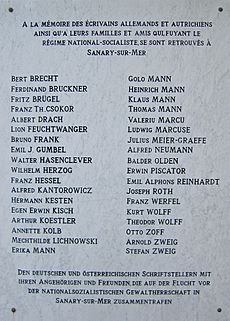Franz Theodor Csokor facts for kids
Franz Theodor Csokor (born September 6, 1885 – died January 5, 1969) was an Austrian writer. He was especially known for his plays, which often used a style called Expressionism. His most famous play is 3. November 1918. It tells the story of the end of the Austria-Hungary monarchy. In many of his works, Csokor wrote about old history and Christian ideas.
Life
Franz Theodor Csokor was born in Vienna, Austria. The name Csokor is Hungarian and means "bunch of flowers." He started studying art history but decided not to finish. From a young age, he felt he was meant to be a playwright. He wrote his first plays before World War I began. In 1913 and 1914, he lived in Saint Petersburg.
During World War I, he served as a soldier. After the war, from 1922 to 1928, Csokor worked in theaters in Vienna. He was a dramaturgist, which means he helped choose and prepare plays for the stage. He worked at the Raimundtheater and the Deutsches Volkstheater.
From 1933, Csokor strongly opposed National Socialism, also known as the Nazis. He even signed a document against them at a meeting of the PEN club in Dubrovnik. In 1938, when Austria became part of Germany (this was called the Anschluss), he chose to leave his home country. He traveled through Poland, Romania, and Hungary. By 1944, he was living in Rome, Italy. During this time, he worked for the BBC, a British broadcasting company. He returned to Vienna in 1946.
In 1947, Csokor became the president of the Austrian PEN Club. This is an organization for writers. He stayed involved with it for many years. In 1968, he also became a vice-president of the International PEN organization.
Csokor believed strongly in Humanism. This means he valued peace, freedom, and human rights. He often wrote about these ideas in his plays. His work was also connected to the labor movement, which worked for the rights of workers.
Franz Theodor Csokor was given the special title of Professor. He died in Vienna and is buried in a special grave at the Zentralfriedhof. In 1975, a street in Vienna was named Csokorgasse in his honor. The Austrian Post Office also released a special stamp for him in 1994.
Awards
- 1937 Golden Laurel of the Warsaw Academy of Letters
- 1937 Gold Cross of Merit (Poland)
- 1937 Burgtheater ring
- 1938 Grillparzer Prize
- 1953 Literary Prize of the City of Vienna
- 1955 Ring of Honour of the City of Vienna
- 1955 Grand Austrian State Prize for Literature
- 1960 Golden Pen
- 1961 Honorary Member of the Press Club Concordia
- 1965 Austrian Decoration for Science and Art
Works
Theatrical pieces
- Die rote Straße, 1918
- Die Stunde des Absterbens, 1919
- Gesellschaft der Menschenrechte, 1929
- Besetztes Gebiet, 1930
- 3. November 1918, 1936
- Gottes General, 1939
- Kalypso, 1942
- Der verlorene Sohn, 1943
- Cäsars Witwe, 1954
- Pilatus, 1954
- Hebt den Stein ab, 1957
- Jadwiga, 1966
- Der tausendjährige Traum, 1966
- Alexander, 1969
- Der Kaiser zwischen den Zeiten, 1969
Prose
- Hildebrands Heimkehr, eine deutsche Sage, 1905
- Schuß ins Geschäft (Der Fall Otto Eißler), 1925
- Über die Schwelle, short stories, 1937
- Der Schlüssel zum Abgrund, novel, 1955
- Der zweite Hahnenschrei, short stories, 1959
- Ein paar Schaufeln Erde, short stories, 1965
- Auch heute noch nicht an Land. Briefe und Gedichte aus dem Exil., 1993
Lyric poetry
- Die Gewalten, 1912
- Der Dolch und die Wunde, 1917
- Ewiger Aufbruch, 1926
- Das schwarze Schiff, 1945, 1947; 1993
- Immer ist Anfang, 1952
Autobiography
- Als Zivilist im polnischen Krieg, 1940
- Als Zivilist im Balkankrieg, 1947
- Auf fremden Straßen, 1955
- Zeuge einer Zeit: Briefe aus dem Exil 1933–1950, 1955
See also
 In Spanish: Franz Theodor Csokor para niños
In Spanish: Franz Theodor Csokor para niños
 | Kyle Baker |
 | Joseph Yoakum |
 | Laura Wheeler Waring |
 | Henry Ossawa Tanner |


